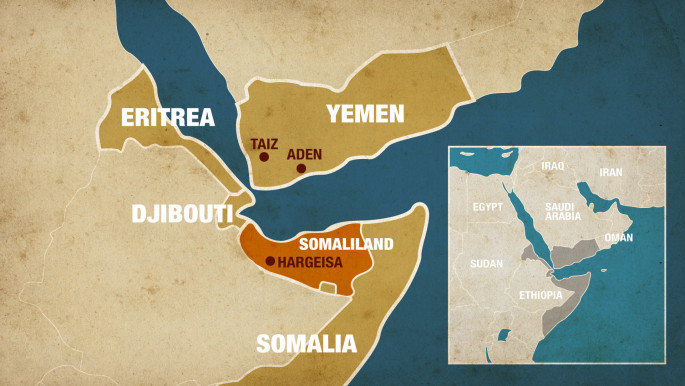Eritrea's Qatar attacks don't come out the blue
Eritrea launched a series of surprise verbal assaults on Doha this week, claiming that Qatar and Sudan were both interfering in the East African state's internal affairs.
A bizarre statement issued by Asmara claimed that the two countries were backing an anti-government figure and that Doha sent fighter aircraft to an area of Sudan close to the Eritrean border.
In an interview with Saudi broadcaster al-Arabiya on Wednesday, an Eritrean diplomat alleged that Qatar had been meddling "for years" in the East African state.
The claim contradicted the cordial relations between the two countries over the past many years.
In 2016, Qatar helped broker a deal which saw four Djibouti prisoners of war released from an eight-year stint in Eritrean captivity.
They were captured during a bloody war between the two countries in 2008, which ended in 2010 when hundreds of Qatari troops were deployed to the fraught border region as peacekeepers.
Last year, Eritrea distanced itself from Qatar and joined a Saudi-led blockade launched on Doha in June.
Claims
Asmara's latest attack on Qatar came through a statement issued by Eritrea's information ministry this week.
In the bizarrely worded complaint, Asmara named Qatar as "one of the military threats that the African horn region could face".
Eritrea went to on to claim that Qatar and Sudan had established a joint military training camp for an Eritrean opposition figure named Mohammed Jumma, described by Asmara as a "radical cleric".
The ministry then alleged that Qatar and Sudan had deployed three MiG fighter jets to Kassala in eastern Sudan, flown by two Qataris and an Ethiopian pilot.
The military deployment was to "thwart" a planned attack by Eritrea "that would be unleashed with the support of the United Arab Emirates", the ministry added.
 |
The historical bond between the peoples of Qatar and Eritrea [is] strong |  |
Qatar and Sudan swiftly denied the claims. Qatar's foreign ministry said Eritrea's reports were "false" and contradict "Qatar's foreign policy principles that respect the sovereignty of other countries and promotes peaceful coexistence".
The statement added that Qatar was committed to security and stability in the Horn of Africa region. "The historical bond between the peoples of Qatar and Eritrea [is] strong," the statement added.
Pressure
Eritrea was one of several African nations to follow the Saudi-led alliance and cut ties with Qatar in June, all of which are believed to have been rewarded by their Gulf patrons.
Shortly after Asmara announced it was cutting ties with Doha, Qatar pulled its 400 peacekeeping troops from the Eritrean-Djibouti border region.
Eritrea soon seized the contested territories that were once monitored by the Qatari troops, despite earlier assurances it would not. It appeared to be a pay-off by the Saudi-led coalition to Asmara for its diplomatic support during the crisis.
The UAE has been building its military and diplomatic relations with Eritrea for some time.
In late 2017, the UN said Abu Dhabi might have broken an international arms embargo imposed on the repressive Eritrean regime and that the UAE was building up its military presence in the state.
 |
The UAE, has meanwhile been expanding its presence along the strategically vital Red Sea coastlines, boosting its military presence in south Yemen and East Africa |  |
Eritrea's role in the Yemen war also remains unclear.
This could be a dangerous escalation in the military balance in the region, given the risk of war between Eritrea and its neighbours Djibouti and Ethiopia still remains high.
With the aggressive military regime in Asmara getting the clear backing of the UAE and Saudi Arabia, things could get worse.
East Africa's fragile peace has not been helped by the dispute over control of the Nile waters. Egypt has signalled it could take military action against Eritrea's historic rival Ethiopia over its massive dam project.
Egypt's ally, the UAE, has meanwhile been expanding its presence along the strategically vital Red Sea coastlines, boosting its military presence in south Yemen and East Africa.
Abu Dhabi is now building up its military presence in Eritrea with a naval and airbase near the port of Assab. Naval ships, helicopters and attack aircraft are thought to be operating from the military base.
UAE-backed Egyptian forces also reportedly entered Eritrea in January, according to the Kuwaiti al-Sharq newspaper.
Given the UAE's other economic and military endeavours in south Yemen, it is likely that Eritrea could be part of Abu Dhabi's plans for controlling key shipping lanes through the Bab al-Mandab strait.
With Turkey also building up its presence and having concerns about Abu Dhabi's designs on the region, the latest allegations from Eritrea - which echo the Saudi-led bloc's own rhetoric - could signify something much bigger.
Follow Paul McLoughlin on Twitter: @PaullMcloughlin




